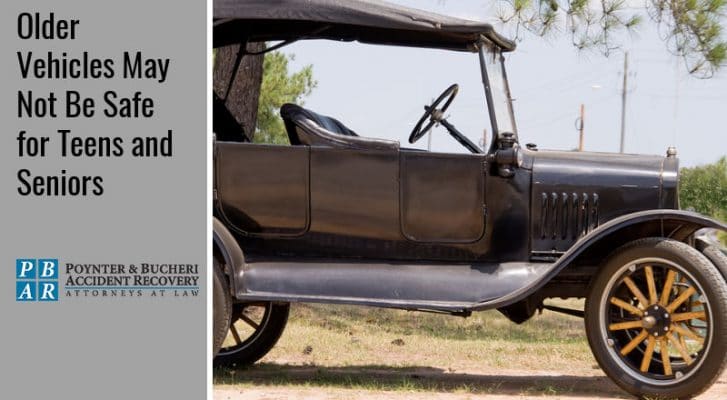
Older Vehicles May Not Be Safe for Teens and Seniors

What you’ll learn reading this article:
- Teens and senior drivers are more likely to be involved in fatal car accidents than drivers age 20-64.
- Older vehicles are less likely to include safety features that have become standard over the years, making them less safe.
- Teens and senior drivers are more likely to own and drive older, less-safe vehicles.
When it comes to operating a vehicle, both teen drivers and senior drivers are in the highest risk groups for accidents in the United States. Teens are often freshly licensed, less experienced and easily distracted, and unfortunately, they are three times more likely to be killed while driving than those age 20 and up.
Senior drivers age 65 and older face a growing likelihood of vision and hearing loss, muscle loss and stiffness, the need for medications, and a higher risk of becoming confused, disoriented, or overwhelmed and anxious while behind the wheel. Because of these changes related to aging, accidents can happen.
Elder individuals also suffer additional medical and physical conditions that make them more likely to be killed or seriously injured in a car accident, such as fragile bones, heart conditions and more. Senior drivers age 65 and older have a car accident fatality rate that is a shocking 17 times higher than that of younger drivers.
Why Vehicle Age Matters
It isn’t just driver age that matters when it comes to safety. The age of the vehicle also matters.
As car manufacturing has progressed and changed thanks to new technologies, the efficiency and safety of cars has also increased. Some of these features include:
- Electronic stability control.
- Traction control.
- Anti-lock brakes.
- Automatic braking.
- Side and curtain airbags.
- Rearview cameras.
- Blindspot warning.
- Adaptive headlights.
- Lane departure warning.
- Front collision detection.
While many of these features have been around for well over a decade and have become standard, some of them are newer and emerging technologies. What they all have in common, however, besides making you safer, is that they don’t tend to exist across the board on vehicles manufactured before 2008. For instance, electronic stability control became standard in the United States in 2012, whereas rearview backup cameras became a mandated feature in 2018.
Cars will continue to become safer and be made to include the newest technologies; over time, these technologies will become standard or even mandated in vehicle production—just like seatbelts. It may seem like they have always existed because they make so much sense, but they only became mandatory in American cars in 1968.
For this reason, newer cars tend to be safer and older cars are riskier. A recent Children’s Hospital of Philadelphia study confirmed this and also found that teen and senior drivers are more likely to drive older cars. Teens tend to inherit a family car or buy an older, less expensive used model, whereas many senior drivers maintain and continue to drive cars from their younger years. This compounds into a potentially deadly equation in which the most at-risk drivers drive the most at-risk cars.
Tips for Teen and Senior Driving Safety
Cars are expensive, and not everyone can afford the newest makes and models. Because of that, it is important to refresh driving safety tips often, especially for newer and older drivers. In addition to common safety protocols, here are some additional tips to keep both newly licensed teens and senior drivers safe:
- Pre-plan your route before leaving, especially if you haven’t been to your destination before. This will prevent you from getting disoriented and distracted.
- Avoid interstates and heavily trafficked roads if there are less-frequented available routes. You are less likely to become overwhelmed or deal with other reckless drivers.
- Avoid driving in inclement weather or at night. It can be disorienting, harder to see and harder to maneuver your vehicle if road or weather conditions affect the car.
- Drive distraction free. Avoid the temptation to listen to music, talk to friends, eat or adjust seat controls while driving. Focus entirely on the act of driving.
Car accidents can leave their victims emotionally, physically and financially devastated. If you’ve been injured in a car accident, you may qualify for compensation. Contact Poynter & Bucheri Accident Recovery today for your free case review.
Poynter & Bucheri Accident Recovery—Indianapolis Personal Injury Attorneys
If you or a loved one has been injured physically or mentally by a person, product or company, you need to know your legal rights. Our personal injury attorneys are experienced with cases like yours and can evaluate what your case may be worth. We will ensure that you are protected and compensated for your injuries and losses.
Why pay up to 40% in attorney fees? Our fee is only 25%*, and we fight to win your case or you pay no attorney fees at all. Don’t hesitate—one of our experienced attorneys can assist you right away.
Call 800-265-9881 for a free case review.
